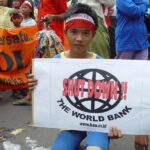Quote:
Poor countries – and poor people – differ from rich ones not only in that they have less capital, but in that they have less knowledge (…) Even greater than the knowledge gap is the gap in the capacity to create knowledge.
Source:
World Bank, (1998/99): World Development Report: Knowledge for Development. New York: Oxford University Press, p. 1.
Author Bio:
 The World Bank is a multinational development bank based in Washington D.C. (USA). Its original purpose was to finance the reconstruction of countries destroyed in the Second World War. Today, the core task is to promote the economic development of "less developed" member states through financial aid, advice and technical assistance.
The World Bank is a multinational development bank based in Washington D.C. (USA). Its original purpose was to finance the reconstruction of countries destroyed in the Second World War. Today, the core task is to promote the economic development of "less developed" member states through financial aid, advice and technical assistance.Context:
The World Bank assesses the development status of countries according to the logic of Western capitalist economies. The assumption that only alignment with these standards will lead to progress in the Global South makes it impossible to recognize non-Western values and world views. From this prevailing development policy perspective, deviating lifestyles and social forms are seen as deficits. And this despite the fact that the Western path of development has not proven itself through exploitation and the destruction of people and nature, among other things. Since its foundation in 1946, all but two of the WB's chairmen have been white American males. Numerous social movements and NGOs in the Global North (attac) and South (Focus on the Global South) have been criticizing and resisting World Bank policies for decades.
Further Reading:
*Franziska Müller & Aram Ziai (2015): Eurocentrism in development cooperation. In: APuZ - Aus Politik und Zeitgeschichte, 7-9.
*Grace Blakeley (2020): The Great World Bank Robbery: An Interview with Walden Bello (Podcast). Tribune Magazine.